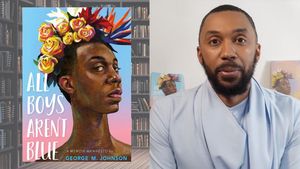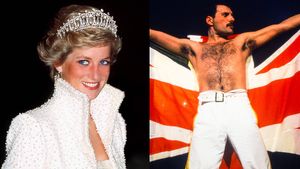To see our exclusive photo slide show of Kylie, click here.
On a sweltering June night, deep in the cool, cavernous belly of the New York Public Library, Kylie Minogue is dressed like Cinderella on her way to the Black Party. In a white Jean Paul Gaultier gown outfitted with a harness that stretches from its leather bustier to fasten around her tiny waist, she looks out over a sea of men pushing bits of rubbery lobster around their salad plates and asks, 'Can you believe I'm here in New York?' The predominantly rich, gay, and famous audience -- Marc Jacobs, Cheyenne Jackson, and Lance Bass among them -- have put out $1,000 or more to see Minogue host amfAR's Inspiration Gala honoring Gaultier and Ricky Martin, and they titter appreciatively in response, delighted to be in on her little joke. They know exactly what the diminutive Australian singer is getting at.
Minogue has sold more than 60 million albums worldwide, was the most-played female artist of the last two decades on U.K. radio, and has received an Order of the British Empire from Queen Elizabeth II for services to music and a Chevalier de l'Ordre des Arts et Lettres insignia, one of France's highest cultural honors. But to most Americans -- the straight ones, anyway -- she is only vaguely familiar, a name they can't quite put with a face but with whom they feel they might have once shared a brief, bright moment years ago.
Minogue came to America in the summer of 1988 -- a baby-faced 20-year-old pop pilgrim peddling a catchy, if slightly dorky, cover of Little Eva's 1962 hit 'The Loco-Motion' -- years before Britney or Christina bobby-pinned their first pairs of mouse ears on top of their heads. She came before Fergie had inhaled her first hit of meth, before Lady Gaga was bluffin' with her muffin (in fact, her muffin was barely out of her mother's oven). But the considerable fame the single brought her in the U.S. dried up faster than you can sing 'chug-a chug-a motion.' By 1989, she seemed well on her way to being a one-hit wonder.
Peter Waterman, one-third of the producing and songwriting team Stock Aitken Waterman -- better known as the Hit Factory and responsible for monster singles from '80s acts like Bananarama, Rick Astley, and Minogue -- partly blames a lack of promotion for the sudden radio silence. 'We couldn't get [Minogue's] people to commit to America,' he says. 'You've got to give America respect -- it's the biggest country in the world as far as record sales are concerned.'
Furthermore, by the early '90s, rap and grunge were taking over the airwaves. Reigning pop queens Madonna and Janet Jackson were dirtying up their images and sound by shedding their inhibitions -- and more and more clothing -- on their albums and in their videos. It was difficult to pinpoint exactly how to pitch the squeaky clean Minogue to an increasingly pop-phobic nation. 'It's very simple to sit in a studio in London and think, This will be a hit in America,' Waterman says. 'But how arrogant is that? We had no bloody clue what would be a hit in America.'
Undaunted by the American lockout, Minogue looked elsewhere and concentrated on promoting her ever-expanding empire -- which today, aside from 11 studio albums, three live CDs, and eight live concert DVDs, also includes bed linens, lingerie, and a line of fragrances. She came to be worshipped as a bona fide pop deity in almost every major market in the world, bar the United States. Minogue was an irresistible mash-up of the girl next door and the simpering sex kitten. Straight women wanted to be her, straight men wanted to bed her, and gay men -- overseas and in the U.S., where they make up the bulk of her fan base -- couldn't get enough of her. 'She's like Glinda the Good Witch,' says Scissor Sisters' Jake Shears, who befriended Minogue when they first worked together in 2004. 'She has a really loving, open, sexy spirit that makes a lot of gay guys think she'd be a great best friend.'
In 2002, she released the throbbing, hypnotic 'Can't Get You Out of My Head,' a clear departure from the bubblegum pop of her previous singles, and the song shot to number 1 on nearly every European chart. Its deceptively simple 'la la la' chorus was so inescapably catchy'and unlike anything else on the radio at the time'that even in the U.S. it launched into orbit in the Billboard Top 10. Still, she forewent touring here, dropping by for just a short spin around the late-night talk-show circuit, and instead chose to channel most of her energy into promoting the single in proven markets like Europe, Australia, and Japan. Other than her public struggle with breast cancer in 2005, it was the only time in the last 20 years that her name resonated in America.
Last September, U.S. fans finally got theirs when Minogue brought her For You, For Me tour to North America, for a short, six-city run. 'I wasn't here to prove anything or sell anything and that was absolutely liberating,' the 42-year-old Minogue says, all five-foot-one of her curled up on a couch in the Mandarin Oriental during a week of nonstop events in New York City, which culminated in a surprise midnight visit to Splash, the city's most famous gay club, where she performed her new single, 'All the Lovers,' and debuted snippets of her 11th studio album, Aphrodite. 'That whole tour last fall was from the heart. I might as well have just burned hundred dollar bills because it cost me a fortune, but I didn't care,' she says. 'I thought, I have to do this now or I'll regret it.'
This sudden urgency was, in part, set ablaze courtesy of one Lady Gaga, whose dizzying ascent to power has in a few short months changed the face of the music industry and whose influence on the market now offers Minogue the opportunity to finally win over America. But, paradoxically, rather than cashing in on the Auto-Tuned, electro-scuzzy craze now dominating radio and the iTunes sales chart (and which she has flirted with in the past, most notably on 2008's X), Minogue is boldly going exactly where she began: back to 1988.
'Lady Gaga dropped a meteor in the middle of the pop landscape -- which is amazing,' Minogue says. 'But it meant that we had to take that into account. It wouldn't have made any sense to go down that road to try to fit in.' Instead, Aphrodite delivers lighthearted pop songs -- woozy with crushes, trampled hearts, and late-night excursions to the local disco -- made up of sweeping piano lines, fizzing synths, and layered background vocals, all of which would have sounded right at home on Minogue's debut.
'The record isn't trying to be clever -- it delivers exactly what we want from Kylie, which is pure pop,' says Shears, who cowrote the standout 'Too Much' with Minogue and Calvin Harris. 'When we were writing lyrics together, sometimes she'd put something down and I'd think, Oh, my God, that is the lamest thing I've ever heard! And then it comes out of her mouth and it's absolutely brilliant. That's the beauty of her and that's the beauty of great pop music'taking something very, very simple and injecting it with meaning and emotion.'
'We didn't want to try to reinvent the wheel,' Minogue says. 'We just wanted to make really good songs.'
Really good -- and really gay. Aphrodite was helmed by executive producer Stuart Price, who is responsible for some of the queerest -- and best -- pop music to emerge from the past decade including Madonna's Confessions on a Dance Floor and Scissors Sisters' recent Night Work. 'I made some of the gayest-sounding songs I've ever made with Kylie and Jake,' Calvin Harris told the Sydney Star Observer. 'I'd listen to it and think, Wow, this is really gay.... The old euphoric rush has something to do with pop music.' Shears agrees. 'I can't stand labeling something 'gay music,' but there is something incredibly anthemic about the album.' For her part, Minogue laughs and claims, 'I don't have any objectivity,' before conceding, 'The songs definitely make you want to put your hands up, which probably makes Jake and Calvin think of being at the club. There's a micro-rush in all of them -- we give you a minute to calm down and then it's 'whoop whoop' all over again.'
But a trip to the club alone does not a gay man -- or gay sensibility -- make. And Minogue's uncertainty regarding Aphrodite's queer quotient is ironic. When her videos aren't directly exploring queer themes -- in 'All the Lovers,' (see above) for instance, Minogue casts herself as a goddess conducting and blessing a pansexual orgy from atop a writhing pyramid of half-naked bodies -- they're soaked in homoeroticism, camp, and the kind of sexual empowerment that has long been an envy of the gay community. Her live shows have featured covers of Boy George's 'The Crying Game,' 'Somewhere Over the Rainbow,' Madonna's 'Vogue,' and ABBA's 'Dancing Queen.' Her muscular, kinetic backup dancers are regularly cross-dressed and coupled in same-sex pairs for playfully raunchy numbers (like a shower scene in a men's locker room). Sometimes they're stripped entirely of their gender, reduced to H.R. Giger'inspired drones that worship Minogue, their alien queen, or dressed as a jubilant gang of futuristic pop-and-lockin' androids. It's almost as if Minogue is attempting to push past our obsession with sex and sexuality to free herself, and us, from its limitations.
Still, unlike other female pop stars, Minogue has never felt the need to pander to gay fans -- or to shock and titillate straight ones -- by flirting with bisexuality. In January, after a Mexican magazine published a story claiming Minogue had admitted to liking women, she responded via Twitter, 'OMG such a load of hype and nonsense ... misquotes and an interview that never HAPPENED!!! Grrrrr!!!' Asked to clarify, Minogue says, 'I didn't speak with a Mexican magazine. They took a bunch of random quotes -- some of which sounded familiar and some they'd taken from somewhere that has nothing to do with me. So far my sexuality has been with men, but I stand by the video for 'All the Lovers' -- if it's love, it's good.'
Legendarily polite about her competitors (she calls Madonna, the woman to whom she has drawn the most comparisons, 'inspiring' and Lady Gaga 'brilliant'), Minogue doesn't have much to say about their supposed penchants for same-sex dalliances. 'I suppose it's pretty trendy. I don't even have a tattoo. I'm so untrendy,' she says, adding, perhaps metaphorically, 'I think maybe I should have one -- I'd secretly like to have a galaxy somewhere.'
Whether or not that galaxy will end up including the United States remains to be seen. Aphrodite is the singer's most cohesive and arguably best work to date, but with Americans still heavily favoring hip-hop and electro-pop, Minogue's brand of pure, heady, and, yes, gay pop might fall on deaf -- or otherwise occupied -- ears. Waterman, the man who helped launch her career all those years ago, suggests no matter how good an album is or how heavily it's promoted there are still too many factors to predict its success. 'You can sit down and plan,' he says, 'but the truth is it might be released on the wrong Tuesday, or the temperature might be too cold for people to come out to your gig, or you may turn up late because of some unperceived circumstances, and suddenly people think you're arrogant and it's over just like that.'
Minogue herself resents the notion that her career is any less successful because she hasn't yet conquered the U.S. 'It's frustrating when people say 'This is finally her push for America' -- it's not like that. It's not centered around whether or not I make it in America, and I think that was poetically proven last year [with the For You, For Me tour],' she says. Shears thinks that at this point in her career, Minogue's success on the charts is the last thing on her mind. 'I think when she came and played [New York City's] Hammerstein Ballroom last fall, it proved that there is a real hunger for her on stage here,' he says. 'She just wants to connect with the people and whether that fan base remains the capacity of the Hammerstein Ballroom or it becomes the entire United States, it doesn't really matter to her.'
Minogue would be lying if she said she didn't care how the United States responds to Aphrodite, but she insists it all comes down to her fans. 'It cuts like a knife if I read a bad review,' she says, stabbing at her chest. 'But in the end, how the album is received by the press won't make any difference to me -- I'd still come back. A few thousand people in a room sharing two or three hours together -- when all the other stuff gets too complex to understand, that's a really good place to bring it back to.'
To see our exclusive photo slide show of Kylie, click here.
Send a letter to the editor about this article.




















































